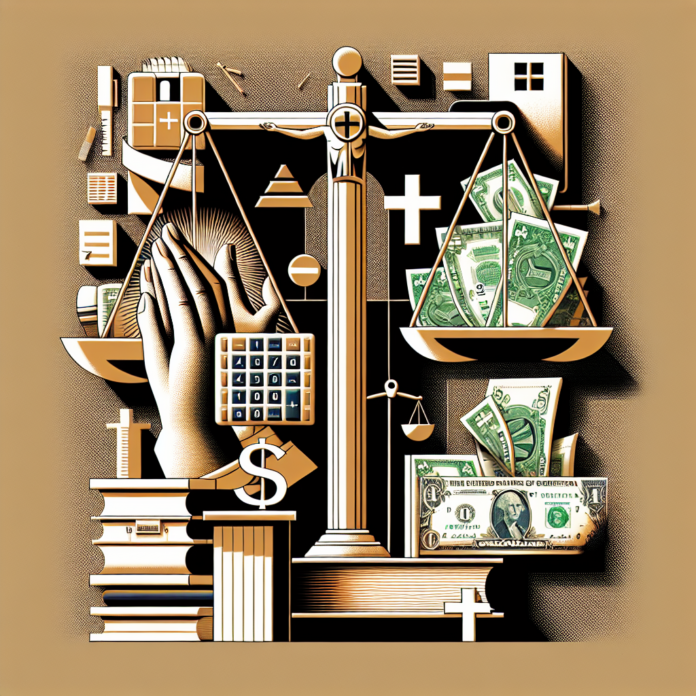Economic Justice Through a Catholic Lens: Why It Matters This Election
In the lead-up to this pivotal election season, one might naturally question which values will most effectively guide our choices at the ballot box. Economic justice, grounded in the rich tradition of Catholic social teaching, emerges as a vital consideration. As we scrutinize the candidates’ platforms and the implications of their policies, it becomes clear that a progressive approach—aligned with the core principles of Catholicism—offers the most promise for promoting justice and equity for all.
At the heart of Catholic social teaching lies the concept of the "preferential option for the poor." This principle asserts that in a world riddled with inequality, the needs of the most vulnerable should take precedence. It is derived from Scripture, where we find repeated calls to defend the rights of the poor and marginalized. This is not just an abstract moral imperative; it demands concrete actions in policy realms such as healthcare, education, and workers’ rights.
Historically, Catholic social teaching has been used to bolster both conservative and progressive agendas. However, a close examination of the teachings of recent Popes, particularly Pope Francis, reveals a clear call towards a progressive economic stance. Pope Francis has been vocal about the sins of economic inequality, referring to unfettered capitalism as "a new tyranny" in his apostolic exhortation "Evangelii Gaudium." He condemns the idolatry of money and advocates for a reevaluation of economic systems that concentrate wealth and disenfranchise the poor. This perspective resonates strongly today as we witness growing wealth disparities exacerbated by global crises such as the COVID-19 pandemic.
The pandemic has laid bare the economic and social fault lines that run through our society. Essential workers, many of whom are marginalized members of society, have borne the brunt of the crisis. They have faced increased risks without corresponding increases in compensation or protective measures. This injustice is a clarion call to voters to support policies that elevate the dignity of work, ensure fair wages, and provide adequate healthcare.
When we examine policies through a Catholic lens, progressive economic policies that embrace these principles become compelling. For example, raising the minimum wage is not merely an economic issue but a moral one. A living wage is essential for ensuring that workers can support themselves and their families with dignity—aligning closely with Catholic teachings on the dignity of work and the rights of workers.
Universal healthcare, another contested topic, also finds support in Catholic social teaching. Healthcare is a basic human right, as reiterated by the U.S. Conference of Catholic Bishops. In a nation where medical debt is a leading cause of bankruptcy, striving for a healthcare system that ensures access for all, regardless of income or employment status, is both a practical and moral necessity.
Some conservative circles within the Catholic community argue for a return to traditional social values as the path to a moral society. However, this perspective often overlooks the structural inequities that plague our nation. It tends to emphasize personal charity over systemic transformation, downplaying the Catholic call for social justice. For instance, while it is undoubtedly virtuous to donate to a homeless shelter, it is equally, if not more, imperative to support policies that address the root causes of homelessness, such as affordable housing and comprehensive mental health services.
Moreover, the conservative embrace of laissez-faire economics and small government is hard to reconcile with Catholic social teaching’s emphasis on the common good. Policies that reduce social safety nets and deregulate industries typically benefit the affluent at the expense of the poor, perpetuating cycles of poverty and inequality rather than challenging them.
The recent student debt crisis offers another poignant example. Over 44 million Americans are saddled with student debt, a burden that disproportionately affects minorities and low-income individuals. The Catholic principle of subsidiarity—organizing society at the most local level possible while ensuring justice and equity—supports interventions that alleviate this debt. Canceling or refinancing student loans could significantly reduce economic burdens on young adults, enabling them to invest in their futures and contribute more robustly to society.
As we approach the decision-making moment in the voting booth, it is crucial to recognize the broader implications of our choices. A progressive vision that prioritizes economic justice, grounded in Catholic social teaching, has the potential to address the systemic injustices that plague our society. By voting for policies and candidates committed to uplifting the marginalized, ensuring fair wages, and providing universal healthcare, we take a step closer to enacting the Gospel’s calls for justice.
In conclusion, now more than ever, economic justice should be at the forefront of our electoral decisions. The tenets of Catholic social teaching provide a robust framework for assessing the moral weight of economic policies. This election, let us heed this sacred call, eschewing traditionalism that perpetuates inequality, and instead embrace progressive values that promote the common good for all.
